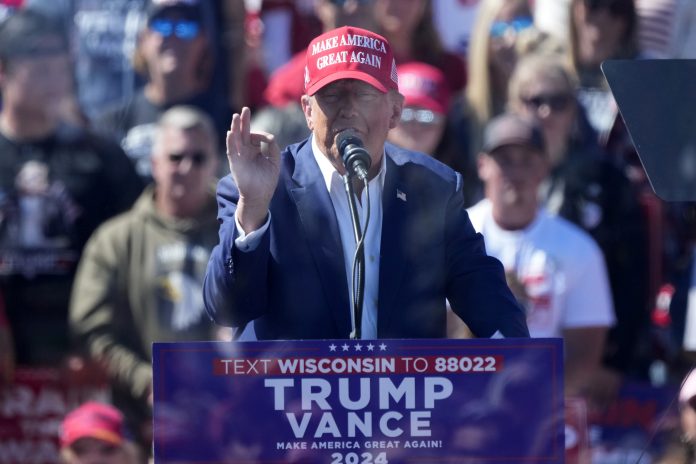Donald Trump and Kamala Harris are neck-and-neck in a new poll of swing states.
The former president appears to be gaining on the vice president in Wisconsin at 49 percent to 48 percent and in Pennsylvania at 48 percent to 47 percent, an Emerson College poll conducted between September 15 to 18 has shown.
However, his lead still lies within the margin of error for both states, of three percent for Wisconsin and 3.2 percent for Pennsylvania, making it too close to call.
The latest New York Times/Siena College poll shows that the two presidential candidates are tied nationally at 47 percent as of September 19.
Morry Gash/AP
If Trump is able to win Wisconsin, he might not need to gain the support of Pennsylvania, Michigan or Nevada, given the state’s importance in previous elections.
The state of Wisconsin counts for 10 electoral votes in the election, according to Britannica, which situates it in the middle of the U.S. states in terms of how many votes each provides for the presidential election.
This doesn’t detract from the state’s sway in the election, as in four of the past six presidential elections the victorious candidates have been decided by less than a percentage point difference there, as U.S. News reported.
The encyclopedia of American politics, Ballotpedia, also noted how between 1900 and 2016, Wisconsin decided the outcome of an election 76.67 percent of the time.
In 2016, Trump narrowly won the state against former Secretary of State Hillary Clinton with a 0.7 percent margin, but in 2020, only just lost it to Joe Biden again with a 0.7 percent margin.
Reflecting on the poll, Cornell University’s Professor Richard Bensel told Newsweek that while the polls are “remarkably similar” to those in 2016 and 2020, “Harris might be a little weaker than either Clinton or Biden.”
He stressed it was still “hard to say” how the current election poll compared to those this time in previous elections, as the pollsters have “changed their techniques” in order to “account for a persistent reluctance of Trump supporters to publicly acknowledge their position.”
Speaking to Newsweek, Johns Hopkins University Professor Paul Weinstein also agreed and said that both Biden and Clinton “had better polling numbers at this point in the race,” and also raised the point that the “polls were not as accurate as they could have been, as both races proved to be much tighter at the end of the day.”
Bensel concluded that “this will almost certainly be a very close election,” but he “would place my wager on the Democrats, but would expect even odds from the Republicans.”
Weinstein agreed, telling Newsweek, “This election is definitely too close to call. While Harris has moved up a little in the national polls since the debate, she still is not where Biden was at this point four years ago.”
He explained that if forced to make a call on the outcome of the election, he “would say Harris has a little bit more momentum right now.”
Donald Trump’s spokesperson Steven Cheung told Newsweek, “These professors are Democrat donors and sit on boards of liberal organizations. Their opinions are useless.”
Responding to Cheung’s claims, Weinstein informed Newsweek that he was on the board of the Progressive Policy Institute, a center left U.S. public policy think tank.
Bensel denied that he had ever donated money to a party candidate, and said, “I am a registered Democrat and sometimes vote in the party primary. However, I have never voted for a major party candidate in a general election since 1972 when I voted for George McGovern.”
He added he does not sit on the board of “any organization whether public, private, charitable, political, or religious.”
If Trump loses Wisconsin, he would need to win Pennsylvania and take back Georgia and Arizona in order to have a chance at claiming the presidency.
Trump could also win by holding North Carolina, where his lead is currently one point ahead of Harris, which is within the margin of error.
In Georgia, his lead has increased to three points ahead of Harris, and in Arizona it has decreased from a 3-point lead to a 1-point lead, which makes it too close to call given the margin of error.
If Harris is able to win all three Midwestern states, she would not need another state to be elected president in November.
Update, 09/20/24, 08:13 a.m. ET: This article was updated with new information and comment from Professor Paul Weinstein.
Update, 09/20/24, 10:50 a.m. ET: This article was updated with comment from Trump’s spokesperson and responses from Weinstein and Bensel.
Do you have a story we should be covering? Do you have any questions about this article? Contact [email protected].

